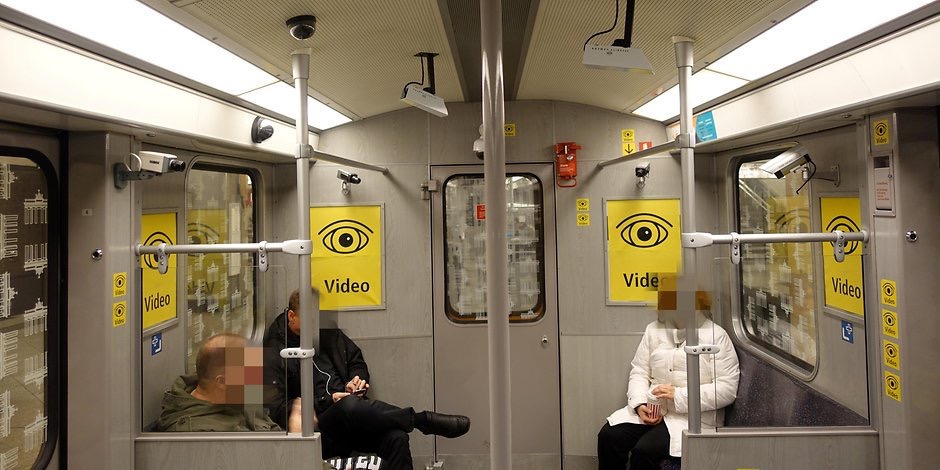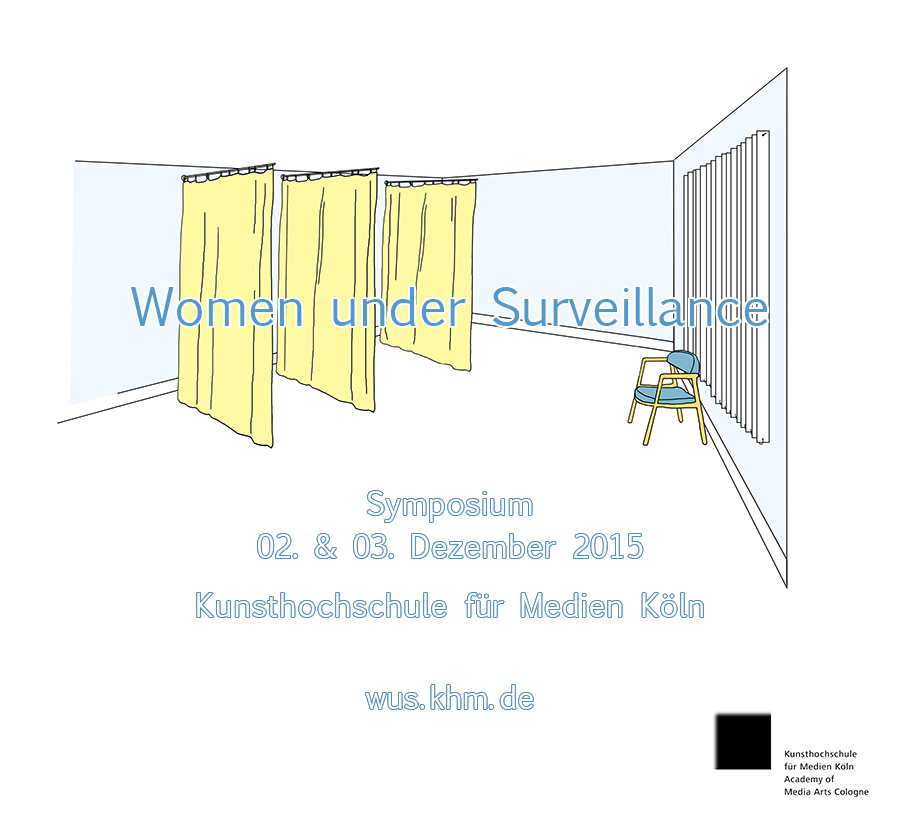I suspect the actual black dome camera wasn’t actually being looked at when this was installed… should teach them something.

I suspect the actual black dome camera wasn’t actually being looked at when this was installed… should teach them something.

Shoshana Zuboff on how we became Google’s slaves. A must-read.
Big other: surveillance capitalism and the prospects of an information civilization Update: Joscha sent in a better link: The Secrets of Surveillance Capitalism
German translation: Überwachungskapitalismus
Nearly 70 years ago historian Karl Polanyi observed that the market economies of the 19th and 20th centuries depended upon three astonishing mental inventions that he called fictions. The first was that human life can be subordinated to market dynamics and be reborn as labor. Second, nature can be subordinated and reborn as real estate. Third, that exchange can be reborn as money. The very possibility of industrial capitalism depended upon the creation of these three critical fictional commodities. Life, nature, and exchange were transformed into things, that they might be profitably bought and sold. The commodity fiction, he wrote, disregarded the fact that leaving the fate of soil and people to the market would be tantamount to annihilating them.
With the new logic of accumulation that is surveillance capitalism, a fourth fictional commodity emerges as a dominant characteristic of market dynamics in the 21st century. Reality itself is undergoing the same kind of fictional meta-morphosis as did persons, nature, and exchange. Now reality is subjugated to commodification and monetization and reborn as behavior. Data about the behaviors of bodies, minds, and things take their place in a universal real-time dynamic index of smart objects within an in finite global domain of wired things. This new phenomenon produces the possibility of modifying the behaviors of persons and things for profit and control. In the logic of surveillance capitalism there are no individuals, only the world-spanning organism and all the tiniest elements within it.
Law Professor Karen Levy writes about the rise of surveillance in our most intimate activities — love, sex, romance — and how it affects those activities.
This article examines the rise of the surveillant paradigm within some of our most intimate relationships and behaviors — those relating to love, romance, and sexual activity — and considers what challenges this sort of data collection raises for privacy and the foundations of intimate life.
Data-gathering about intimate behavior was, not long ago, more commonly the purview of state public health authorities, which have routinely gathered personally identifiable information in the course of their efforts to (among other things) fight infectious disease. But new technical capabilities, social norms, and cultural frameworks are beginning to change the nature of intimate monitoring practices. Intimate surveillance is emerging and becoming normalized as primarily an interpersonal phenomenon, one in which all sorts of people engage, for all sorts of reasons. The goal is not top-down management of populations, but establishing knowledge about (and, ostensibly, concomitant control over) one’s own intimate relations and activities.
After briefly describing some scope conditions on this inquiry, I survey several types of monitoring technologies used across the “life course” of an intimate relationship — from dating to sex and romance, from fertility to fidelity, to abuse. I then examine the relationship between data collection, values, and privacy, and close with a few words about the uncertain role of law and policy in the sphere of intimate surveillance.
(via Bruce Schneier)
Dark Content (2015)
http://0100101110101101.org/dark-content/
by Eva and Franco Mattes
A series of videos about internet content moderators: the extraordinarily significant, yet elusive, individuals who determine how much breast is too much breast for Instagram, or are tasked with scrubbing photos of Osama bin Laden from search engines.
New episodes are released periodically and only on the Darknet. To watch them download the Tor Browser and use it to go to http://5cqzpj5d6ljxqsj7.onion

Another good critique of the ideology behind CCTV: Esther Hovers’ series False Positives
This week, in the European Parliament in Brussels, a “defense and security consultant” from a group called “Global Security Response” presented a new kind of solution to terrorism. Showing in a very clever way how the military approach to terrorism is failing.
I love the look of those spheres.
Here’s the entire presentation including slides. Some photos and the press release. More photos. The fake company website.
“The omnipresent gaze? Surveillance between visibility and the management of norms.”
Guest lecture by Dr. Nils Zurawski
Institut für kriminologische Sozialforschung at Uni Hamburg,
founder of the Surveillance Studies network
www.surveillance-studies.org
Wednesday, 13 January 2016
Surveillant Architectures Group
room 2, Filzengraben 2a
KHM Cologne
Upcoming conference in Barcelona: http://www.surveillance-studies.net/?p=1162
Please scroll down for English version
Symposium
2. & 3. Dezember 2015
Kunsthochschule für Medien Köln
Filzengraben 2, 50676 Köln
Das zweitägige Symposium Women under Surveillance tritt vermeintlich neutralen Definitionen von Überwachung entgegen. Es führt einen künstlerischen und interdisziplinären Dialog über Überwachung im Digitalzeitalter. Dieses Bezugsfeld wird dabei mit einem besonderen Fokus auf dessen Bedeutung für Frauen diskutiert.
Das Symposium bringt Vorträge, Performances, Installationen und Filmscreenings zusammen, die sich mit Themen wie Datensammlung oder Kontrollobsessionen im Namen der Sicherheit auseinandersetzen.
Ziel ist die reine Diskussion, ob exzessive Überwachung notwendig und zielführend ist angesichts einer zunehmend unsichereren Welt, hinter sich zu lassen und stattdessen anhand geschlechtsspezifischer historischer Überwachungskomplexe, wie beispielsweise der Regulierung der Autonomie der Fortpflanzung und der Sexualität, die Frage zu stellen, wer von wem beobachtet wird, wie, warum und zu welchen Kosten?
Konzeption und Organisation: Prof. Julia Scher, Christian Sievers, Dieuwke Boersma und die Surveillant Architectures Group an der Kunsthochschule für Medien Köln. Filmprogramm kuratiert von Christa Pfafferott. Design von Stephanie Glauber.
Im Rahmen des Symposiums präsentiert GLASMOOG – Raum für Kunst & Diskurs an der Kunsthochschule für Medien Köln „Tektite Revisited“, ein Ausstellungs- und Filmprojekt der Filmemacherin Meghan O’Hara und des Kunsthistorikers James Merle Thomas.
Referenten / Performer:
bankleer (KünstlerInnengruppe, Berlin)
chicks on speed (KünstlerInnengruppe, Köln/Hamburg)
Sophie Maintigneux (Bildgestalterin, Professorin für Bildgestaltung, KHM)
Karin Michalski (Vertretungsprofessorin für Kunst- und Medienwissenschaften/Gender, KHM)
Lívia Nolasco-Rozsas (Kuratorin, ZKM Karlsruhe)
Meghan O’Hara (Filmemacherin, California State University, Monterey Bay, Seaside, CA) & James Merle Thomas (Kunsthistoriker und Kurator, University of Southern California, Los Angeles, CA)
Christa Pfafferott (Autorin und Regisseurin, Hamburg)
Angela Richter (Regisseurin, Schauspiel Köln)
Katrin Schlösser (Filmproduzentin, Professorin für kreative Film- und Fernsehproduktion, KHM)
Dirk Schulz (GeStiK – Gender Studies, Universität zu Köln)
Mark von Schlegell (Autor und Kulturtheoretiker, Köln)
Mi You (Wissenschaftliche Mitarbeiterin, Kunst- und Medienwissenschaften, KHM)
und Studierende der KHM
The two-day symposium Women under Surveillance counters neutral definitions of surveillance to establish a platform for artistic and interdisciplinary dialogue along the lines of women and surveillance in our digital age.
Lectures, performances, installations and film screenings go deeper into the critical means of collecting data and monitoring processes in the name of security and the general interest of the “public”.
The symposium aims to move beyond the discussion whether excessive surveillance is a necessary and productive practice in an increasingly insecure world.
Rather, in taking the gendered history of surveillance strategies as its starting point—such as the regulation of women’s productive autonomy and sexuality—the symposium engages artistically and critically with questions as: “Who is being watched by whom, how, why and at what expense?”
Konzeption und Organisation: Prof. Julia Scher, Christian Sievers, Dieuwke Boersma and the Surveillant Architectures Group at Academy of Media Arts Cologne. Filmprogram curated by Christa Pfafferott. Design by Stephanie Glauber.
As part of the symposium, GLASMOOG – Raum für Kunst & Diskurs at the Academy of Media Arts Cologne presents “Tektite Revisited”– an exhibition and film project by filmmaker Meghan O’Hara and art historian James Merle Thomas.
Speakers & Performers:
bankleer (artist group, Berlin)
chicks on speed (artist group, Cologne/Hamburg)
Karin Michalski (professor for art and media studies/gender, KHM)
Lívia Nolasco-Rozsas (curator, ZKM Karlsruhe)
Meghan O’Hara (filmmaker, California State University, Monterey Bay, Seaside, CA)
& James Merle Thomas (art historian and curator, University of Southern California,
Los Angeles, CA)
Sophie Maintigneux (cinematographer, professor for artistic cinematography, KHM)
Christa Pfafferott (author and film director, Hamburg)
Angela Richter (director, Schauspiel Köln)
Katrin Schlösser (film producer, professor for creative film and TV production, KHM)
Dirk Schulz (GeStiK – Gender Studies in Cologne, University of Cologne)
Mark von Schlegell (author and theorist, Cologne)
Mi You (assistant researcher, art and media studies, KHM)
and students of the KHM

Opening this Thursday! (12th November 2015, 18:00, Dortmunder U, Cinema, free admission) Welcome addresses, opening lecture (de) by Hans Ulrich Reck (Academy of Media Arts Cologne), film programme, part I: “Living Data” with works by Walter Koch, Ridley Scott, Norman Cowie, Emma Charles, Steffen Köhn, Jen Liu, introduction: Florian Wüst.
And this is just day one. Programme booklet (Programmheft): www.medienwerk-nrw.de/news/everystepyoutake
I’m on a panel with someone from the fantastic Peng!Collective on Sunday Nov 15, from 17.30-18.30, talking about my Hop 3 project currently on show here in Cologne, and how art & activism can go together.
On Saturday Nov 14, Holly Herndron will perform together with Mat Dryhurst in the context of the medienwerk.nrw conference “Every Step You Take” – Art and Society in the Data Age” , at Dortmunder U – Centre for Art and Creativity. Admission is free! Please RSVP here: tickets [at] medienwerk-nrw [dot] de
Video: Holly Herndon/Metahaven (already a classic)